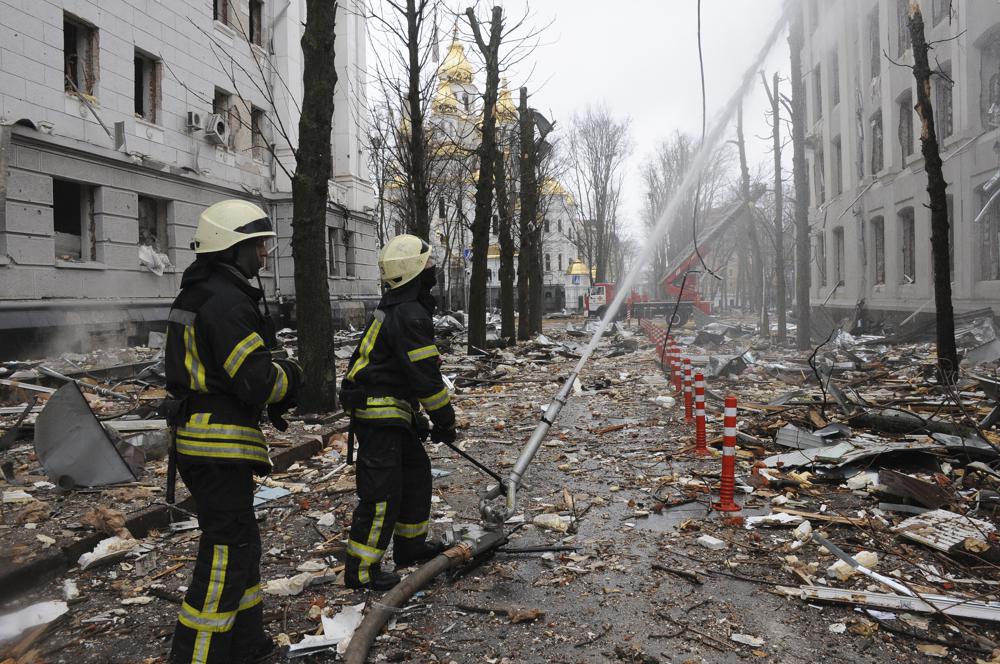President Joe Biden has called Russia’s war on Ukraine a genocide and accused Vladimir Putin of committing war crimes. But his administration has struggled with how much intelligence it is willing to give the Ukrainian forces that are trying to stop the Russian leader.
Since the war began in late February, the Biden administration has made multiple changes to a classified directive that governs what U.S. agencies are supposed to share with Ukraine. Much of what the United States collects is shared; some is not. Where the line is drawn depends on protecting the sources and methods of the intelligence, but also trying to limit the risk of escalation with a nuclear-armed Russia.
The latest changes occurred last week when U.S. intelligence officials lifted some geographic limits on the transfer of actionable information — the kind of information used in minute-by-minute decisions on the battlefield. According to several people familiar with the issue who spoke on condition of anonymity to discuss classified matters, officials removed language that had limited the specific locations of potential targets in parts of eastern Ukraine.
The shifts in the intelligence rules reflect the administration’s changing calculations of what Putin might consider escalatory. The U.S. is also trying to step up support to Ukrainian forces that have surprised much of the world in how they have held back Russia but remain undermanned and outgunned. The Pentagon this week also announced $800 million in new military assistance that could include more powerful weapons and defensive equipment.
Some people familiar with the directive say there is ambiguity about the new limits. One question is whether the U.S. would delay or limit information about a possible Russian target in areas internationally recognized as Ukrainian territory but that Moscow or its proxies controlled before the war, including the Crimean Peninsula and parts of the Donbas. U.S. personnel have at times limited intelligence that they believed Ukrainian forces could use to retake previously lost territory.
The directive still limits information given to Ukrainians about forces in Russia or neighboring Belarus, where Russian forces have staged and previously attacked from Ukraine’s north.
“We are intensely sharing timely intelligence with the Ukrainians to help them defend themselves throughout their country, including in areas held by Russia before the 2022 invasion,” said one U.S. intelligence official who spoke on condition of anonymity to describe the classified directive. The Wall Street Journal first reported the directive had been changed.
Another U.S. official who spoke on condition of anonymity to discuss intelligence matters said the administration was “providing detailed, timely intelligence to the Ukrainians on a range of fronts.”
A letter sent Monday by Republicans on the Senate Intelligence Committee — after the new guidance — urges Avril Haines, the director of national intelligence, to “proactively share intelligence with the Ukrainians to help them protect, defend, and retake every inch of Ukraine’s sovereign territory, which includes Crimea and the Donbas.”
The senators said they “remain deeply concerned that not enough is being done to share critical intelligence that would assist the Ukrainians as Russian forces move to secure territory in the southern and eastern parts of the country.”
Unlike a Feb. 9 letter to Biden urging intelligence sharing “to the fullest extent possible,” Democrats on the committee did not join this week’s letter, reflecting apparent divisions in how members view the administration’s current guidance.
The White House insists it is providing information in line with Ukraine’s current goals. Analysts say the war is shifting from a conflict fought across the country to a stronger focus on the southern and eastern parts of Ukraine that Russia has seized or attacked recently. One expected point of focus is the strategic port city of Mariupol, whose mayor says more than 10,000 civilians have been killed in the Russian siege.
In addition to its own intelligence capabilities, Ukraine relies on U.S. and Western support to help it plan and repel attacks. Before and during the war, the U.S. has publicly and privately shared intelligence about what it believes are Putin’s battle plans in the hopes of undercutting Russia and building support for a forceful Western response.
Lawmakers from both parties have spoken broadly about the limits since the Russian invasion.
Rep. Adam Smith, chairman of the House Armed Services Committee, said in a television interview in March that the White House was holding back some real-time intelligence “because that steps over the line to making us participating in the war.” A spokesperson for Smith, D-Wash., declined an interview request Wednesday.
Sen. Ben Sasse, R-Neb., on March 1 accused the White House of delaying intelligence due to “overly-lawyered processes,” adding that “information about where an invading Russian tank was 12 hours ago does squat to prevent civilian bloodshed.”
The directive has been changed to limit delays, officials said. The latest update, according to one intelligence official, is intended to give U.S. officers “added clarity” allowing for faster and more fulsome cooperation with Ukraine.
Sen. Tom Cotton, R-Ark., asked Defense Secretary Lloyd Austin last week if the U.S. was giving Ukraine intelligence to carry out operations in Crimea or parts of the Donbas previously controlled by Russian proxies.
“We want to make sure that’s clear to our force, and so updated guidance that goes out today will make sure that’s clear,” Austin said, adding: “Certainly the current guidance was not clear in that regard, so we’ll make sure it’s clear.”
Ohio Rep. Mike Turner, the top Republican on the House Intelligence Committee, late last month asked Gen. Tod Wolters, the supreme NATO commander for Europe, whether he was satisfied with the speed of information getting to Ukraine.
“Congressman, I’m comfortable, but I want it to speed up,” Wolters said. “And I always will say that even if it occurs in one second, I want it tomorrow to be in a half a second.”
(AP)











